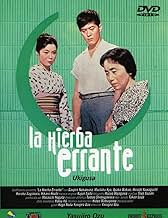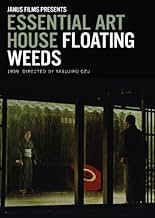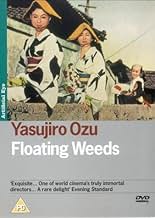IMDb-BEWERTUNG
7,9/10
9491
IHRE BEWERTUNG
Füge eine Handlung in deiner Sprache hinzuThe head of a Japanese theatre troupe returns to a small coastal town where he left a son who thinks he is his uncle, and tries to make up for the lost time, but his current mistress grows j... Alles lesenThe head of a Japanese theatre troupe returns to a small coastal town where he left a son who thinks he is his uncle, and tries to make up for the lost time, but his current mistress grows jealous.The head of a Japanese theatre troupe returns to a small coastal town where he left a son who thinks he is his uncle, and tries to make up for the lost time, but his current mistress grows jealous.
- Regie
- Drehbuch
- Hauptbesetzung
Empfohlene Bewertungen
An itinerant troupe of Kabuki players bring their shows to the small town in which their leader Komajuro (Nakamura Ganjiro II) sired a son (Kiyoshi, Hiroshi Kawaguchi) from whom he has hidden his parentage. This beautifully made film is Yasujiro Ozu's 'remake' of his 1934 silent (A Story of Floating Weeds). Like all of Ozu's films, little happens as his static camera catches vignettes of the various shabby players as they try to hustle up an audience for their dated show, hit on the local girls (in several amusing scenes), and drink. Much of the story is about Komajuro's reconnecting with Oyoshi (Haruko Sugimura), the mother of his son and the jealous reactions of Sumiko, Machiko Kyo, his current mistress. Like all of Ozu's films, the drifting apart of generations is a focus as Komajuro struggles to ensure that Kiyoshi will go to university and not be destined to live the same life as his parents or the members of the troupe. Like the original, the story and the 'feel' is poignant and melancholy (although there are some comical moments, I missed the scenes in the silent version in which the little boy with the errant bladder plays a dog when the troupe is on stage). Watched with English subtitles.
This, one of Ozu's last films, has all the elements of a Shakespearean tragedy played out among people living simple, workaday lives: deceit, jealousy, betrayal, vengeance, love, hope. It's all there. The acting by an all-star cast (at the time) of Japanese actors, including the gorgeous Ayako Wakao, is uniformly excellent. The cinematography may be the best I've seen for any color film made in the 1950's. The overall pace was a bit too slow for my liking, but it works well with a static camera taking every shot below eye level. This gives the viewer a visual perspective similar to looking at the actors on a slightly elevated stage, just as the audience does when watching the plays put on by the itinerant group of actors that centers the film. Overall, a well-crafted work by a recognized master, but not for the 'explosions & car chase' crowd. Rating: 8/10
... aren't we all, their lives steadily unravelling as their audience shrinks, their relationships stretched with secrets, revenge and deception coming to the fore. A poetic observation of life that turns the seemingly ordinary into something quite the opposite and, as relevant today as it has always been, as it encourages you to reflect on who you really are or have been, where you've come from and, more importantly, where you might be going.
Komajuro Arashi and his acting troupe arrive in a small fishing village on the coast of Japan. Komanjuro goes to visit a woman who runs a sake bar, and who, we learn, is a former lover, and with whom he fathered a child, though the child is unaware of this fact and believes him to be his uncle
Their son, Kiyoshi, has just finished high school, and Komanju comes to see him as much as his former lover. He hopes that Kiyoshi will be able to become something in his life and not end up like Komanju himself, a washed-up actor drawing small crowds for his failing samurai productions.
When Komajuro talks with his gorgeous young son, we can see the excitement in his eyes, in his face. The acting here is all rather flat, or better, it's reserved. (Ozu adds a little joke to this later in the film, when on a fishing boat Kiyoshi accuses his father of being "too muggy" in his performance.) This adds to the impact of the few emotional (and physical) outbursts later in the film.
The conflict in the film is that of Komajuro's double lives. When his current mistress, Miss Sumiko -- a jealous and conniving witch of a woman -- discovers that he's been seeing some other woman, she's enraged, and plots what she believes will be his sort of downfall. By hiring a young woman, Kayo, to seduce Kiyoshi and embarrass Komajuro, she plans on making the two seem like different generations of the same person, both relating with unimportant actresses, thereby ruining Komajuro's hopes of his son becoming somebody important.
Unlike most, Ozu is an auteur because of what he doesn't do. His unmoving camera, which is famous, sits placidly, observing the characters with interest. I do sometimes wish that the camera would move around curiously, interested in the conversations of the characters, but maybe Ozu's point was that his camera is (or we should be) too interested to move, and that the events of everyday life need not be jazzed up for entertainment purposes. (He seems to mock this idea when he has Komajuro say to Kiyoshi about his plays that, basically, modern audiences can't appreciate good drama.) The entire film is restrained; on the rare occasion when people cry, they cover their faces and softly whimper.
The ending shot of a dark blue sky, with red lights from a rolling train, reminds us that whether it's 2003 in North America or 1959 in a small Japanese fishing village, we're all the same people with the same problems.
In and of itself, the film is terrifically simple: a simple story, with simple acting, simple music, and made even more simple by the simplicity of the static camera. But what makes the film something special, rather than just some family drama, is the honesty. Ozu isn't after anything big here. Any enlightenment comes from Ozu's realization that the most important conflicts are in the home, the ones no one sees, the ones we all feel.
****
Their son, Kiyoshi, has just finished high school, and Komanju comes to see him as much as his former lover. He hopes that Kiyoshi will be able to become something in his life and not end up like Komanju himself, a washed-up actor drawing small crowds for his failing samurai productions.
When Komajuro talks with his gorgeous young son, we can see the excitement in his eyes, in his face. The acting here is all rather flat, or better, it's reserved. (Ozu adds a little joke to this later in the film, when on a fishing boat Kiyoshi accuses his father of being "too muggy" in his performance.) This adds to the impact of the few emotional (and physical) outbursts later in the film.
The conflict in the film is that of Komajuro's double lives. When his current mistress, Miss Sumiko -- a jealous and conniving witch of a woman -- discovers that he's been seeing some other woman, she's enraged, and plots what she believes will be his sort of downfall. By hiring a young woman, Kayo, to seduce Kiyoshi and embarrass Komajuro, she plans on making the two seem like different generations of the same person, both relating with unimportant actresses, thereby ruining Komajuro's hopes of his son becoming somebody important.
Unlike most, Ozu is an auteur because of what he doesn't do. His unmoving camera, which is famous, sits placidly, observing the characters with interest. I do sometimes wish that the camera would move around curiously, interested in the conversations of the characters, but maybe Ozu's point was that his camera is (or we should be) too interested to move, and that the events of everyday life need not be jazzed up for entertainment purposes. (He seems to mock this idea when he has Komajuro say to Kiyoshi about his plays that, basically, modern audiences can't appreciate good drama.) The entire film is restrained; on the rare occasion when people cry, they cover their faces and softly whimper.
The ending shot of a dark blue sky, with red lights from a rolling train, reminds us that whether it's 2003 in North America or 1959 in a small Japanese fishing village, we're all the same people with the same problems.
In and of itself, the film is terrifically simple: a simple story, with simple acting, simple music, and made even more simple by the simplicity of the static camera. But what makes the film something special, rather than just some family drama, is the honesty. Ozu isn't after anything big here. Any enlightenment comes from Ozu's realization that the most important conflicts are in the home, the ones no one sees, the ones we all feel.
****
"Floating Weeds" (Japanese, 1959): The first few things I notice about films by writer/director Ozu are: the incredibly consistent, artful composition used in his shots; his patience with the "ordinary"; and his intentional avoidance of "action" and blatant "drama". His films are meditative exercises on the daily truths we humans must face, which contain their own realistic challenges. Like Bergman and Allen, he too often uses the same actors, non-exotic locations, and stays within a philosophical area of interest that is obviously not market driven
which earns them dedicated followers...even after death. Ozu's films are pure elegance.
Wusstest du schon
- WissenswertesStated by cinematographer Kazuo Miyagawa about director Yasujirô Ozu: "I'll never forget that, from the first day on, he knew the names of everybody on the set, fifty people in the crew, people he'd never worked with. He'd written their names down, I learned later. But everyone was impressed and became devoted to him. Every single day working on this film was extremely pleasurable and enriching. In each of Ozu's films you can sniff his personality. He was pure, gentle, light-hearted, a fine individual."
- PatzerNear the end, sandals disappear or move around: after Kiyoshi argues with his father, he runs upstairs, first slipping out of his sandals and leaving them at the bottom (center) of the stairs. Moments later, Kayo goes up to him. We see that she, too, removes her sandals at the bottom of the stairs. But Kiyoshi's sandals have now suddenly disappeared: we see only Kayo's sandals at the bottom of the stairs. Moments later, Kiyoshi comes back downstairs to go after his father. He goes to put on his sandals, which have now suddenly reappeared, but in a different location from where he took them off. A moment later, Kayo also comes down the stairs and puts on her sandals, which are approximately where she had removed them and placed them, moments earlier.
- Zitate
Komajuro Arashi: You can't help an empty house, when it's empty.
- VerbindungenFeatured in Siskel & Ebert Holiday Gift Guide (1989)
- SoundtracksWasurecha iyayo (aka: Don't forget me)
Composed by Yoshikatsu Hoshoda
Sang by the play troupe on a ship
Top-Auswahl
Melde dich zum Bewerten an und greife auf die Watchlist für personalisierte Empfehlungen zu.
- How long is Floating Weeds?Powered by Alexa
Details
- Laufzeit1 Stunde 59 Minuten
- Seitenverhältnis
- 1.37 : 1
Zu dieser Seite beitragen
Bearbeitung vorschlagen oder fehlenden Inhalt hinzufügen



































